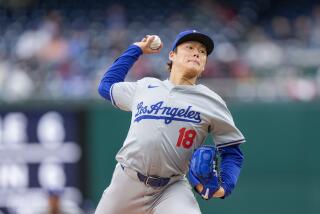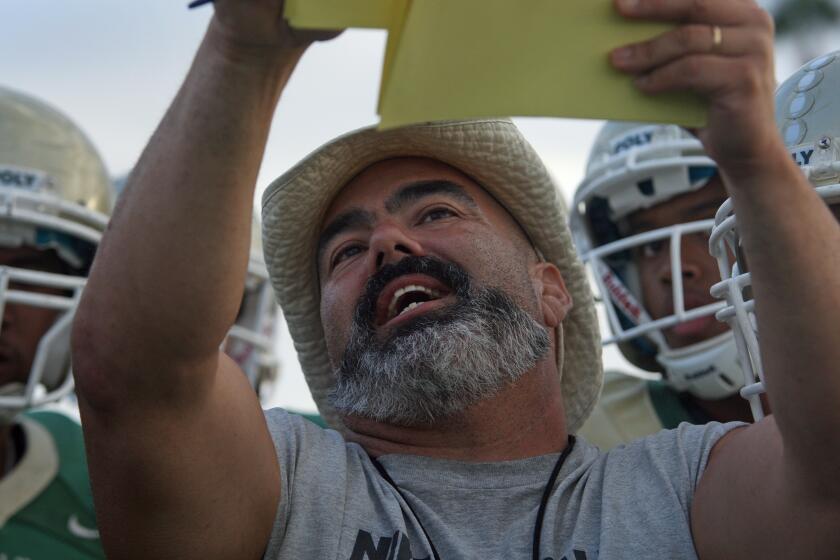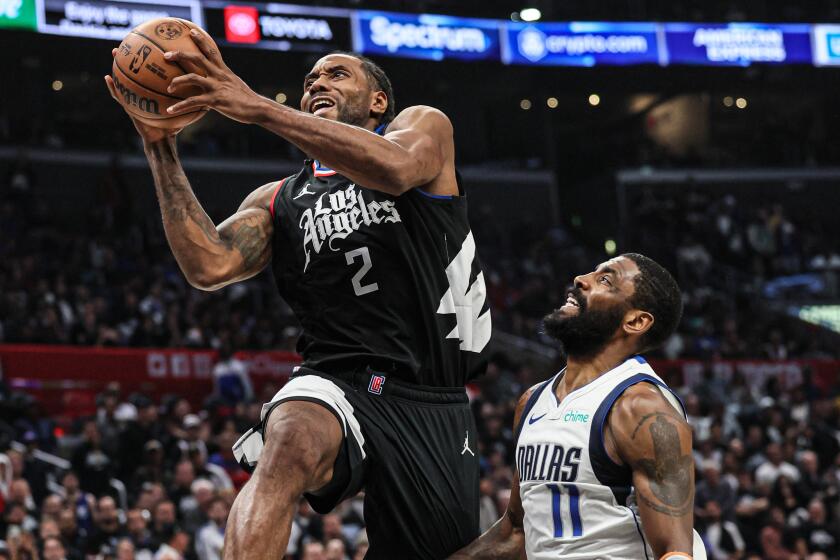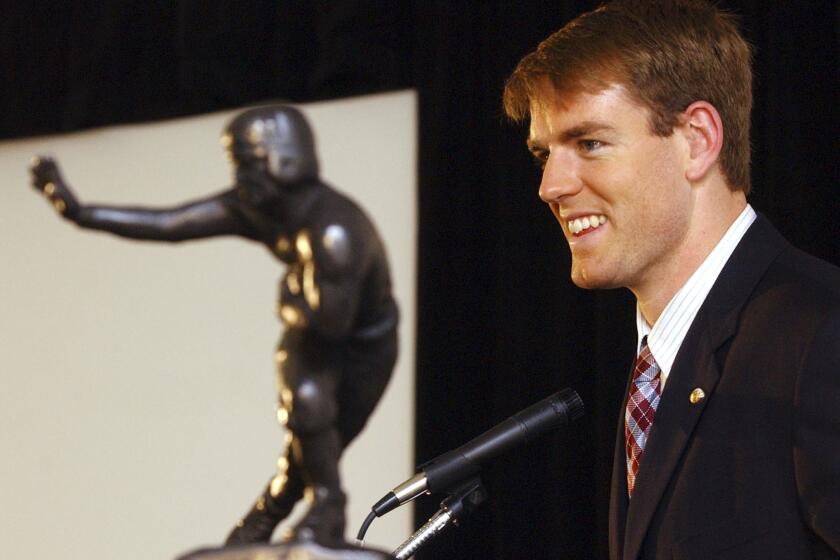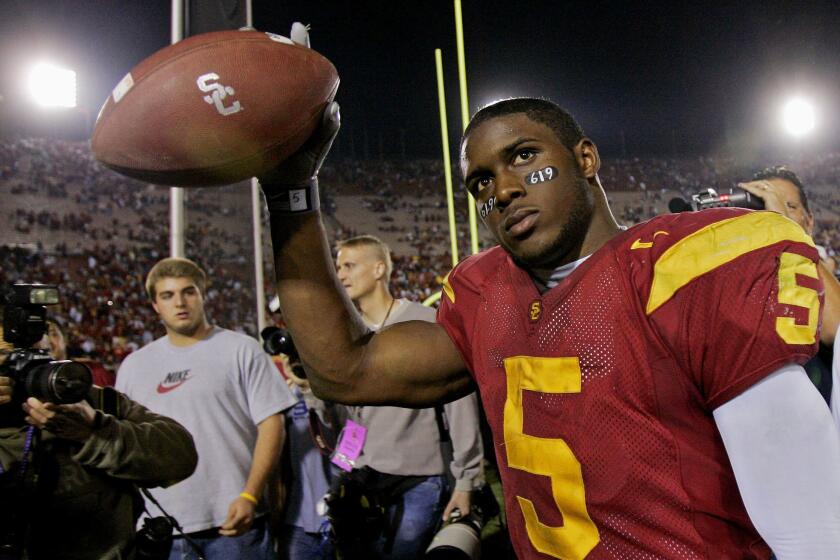Landis hearing ends in volleys of recrimination
The legal marathon between Tour de France winner Floyd Landis and the sports agency accusing him of doping to win the 2006 endurance race finally reached the deliberation stage Wednesday, with no yellow jersey in sight to indicate who leads.
Day 9 of public hearings was dominated by closing arguments and final mud-slinging.
Lawyers for the United States Anti-Doping Agency (USADA) labeled the American cyclist an unscrupulous cheater. Landis’ defense team called positive drug tests the product of an incompetent French laboratory trying to cover up its errors.
USADA prosecutor Richard Young told a three-member arbitration panel that the agency had met its burden of proof under the program’s rules -- to establish by scientific evidence that Landis had taken synthetic testosterone.
He also departed from traditional scientific argument by trying to impugn Landis’ character. Young returned repeatedly to the most dramatic, if scientifically unrevealing, development of the hearing -- disclosure that Landis’ business manager, Will Geoghegan, had made an anonymous phone call to a scheduled witness.
“Typically, you only get to hear about what is in an athlete’s urine,” Young said. “Here you’ve also seen a glimpse of what is in the athlete’s mind.”
Greg LeMond, a former Tour champion who testified against Landis, said he received the call and thought it was intended to frighten him out of testifying. Landis fired Geoghegan shortly after LeMond’s testimony.
Landis attorney Maurice Suh dismissed references to the Geoghegan phone call as USADA’s efforts to establish “guilt by association.” He argued that the incident had “nothing to do with the science behind this case.”
The Landis legal team hewed closely to what has been the accused cyclist’s defense strategy from the start: trying to place on trial the World Anti-Doping Agency’s Paris laboratory that tested Landis’ urine samples positive for testosterone.
Suh argued, for example, that the lab had committed a raft of procedural and analytical errors that reduced its damning test results to mere guesswork.
“We have looked behind the false positive, at what supports it,” Suh said, “and what supports it is incompetence and misrepresentation.”
He contended that the lab’s procedures were so sloppy that its staff falsified documents to conceal its shortcomings. Time gaps in the analytical record, he argued, suggested that the lab had re-analyzed control samples repeatedly until it obtained results that showed its equipment was working properly.
“That’s not quality control,” he said. “It’s fraud.” The summations, both illustrated with sophisticated multimedia presentations, ended the longest arbitration hearing held under the current anti-doping system and the only one conducted in public. It also subjected the science and procedures of the program to uniquely searching scrutiny.
“This is the first case to comprehensively challenge the systematic failures of an anti-doping lab,” Suh said.
In noting testimony that lab technicians had deleted some test records, overwriting computer entries with data from subsequent tests, Suh argued: “Why hide things if everything being done is correct?”
Young minimized lab errors as minor and accused Landis’ side of inflating them into sinister conspiracies. He said Suh was trying to characterize the lab’s young technical staff as “incompetent on the one hand or skilled evil geniuses on the other.”
“We don’t think they’re evil, and certainly not geniuses,” Suh shot back. “We think this is incompetence and a lack of training.”
He also asserted that the international anti-doping system, by prosecuting its disciplinary cases without public scrutiny, had sanctioned the Paris lab’s cavalier approach toward documentation and confirmation of its test results. Alluding to WADA’s legal standard of proof, he asked the arbitrators: “Do you now have a ‘comfortable satisfaction’ that everything is accurate? Do you feel it? Because we don’t.”
“The science is solid,” USADA’s Young concluded. “Mr. Landis had [synthetic] testosterone in his Stage 17 sample, and in his effort to win at all cost, he cheated the rules of cycling, and he got caught.”
The hearing does not end the case; no verdict was rendered.
The arbitrators asked both sides to submit legal briefs two weeks after they receive official transcripts of the nine-day hearing, which could extend written arguments into late June. The schedule suggests that the panel may not issue its decision until midsummer or later, leaving a cloud over the 2006 champion even as the Tour de France resumes July 7.
Landis faces a possible two-year suspension from competition and the loss of his Tour title if USADA’s accusation is upheld. Either side can appeal the arbitrators’ ruling to the Court of Arbitration for Sport, based in Lausanne, Switzerland.
In that event, the trial would begin anew, although Landis’ resources might well be pressed; he has estimated that the proceedings so far have cost him $2 million, some of which he raised in a public appeal for donations.
*
More to Read
Get our high school sports newsletter
Prep Rally is devoted to the SoCal high school sports experience, bringing you scores, stories and a behind-the-scenes look at what makes prep sports so popular.
You may occasionally receive promotional content from the Los Angeles Times.


